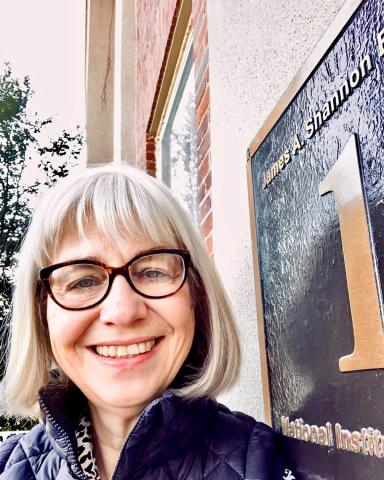OCPL’s Kolberg Remembered

NIH mourns the unexpected passing of Rebecca Kolberg, chief of the NIH Director’s Presentations Branch in the NIH Office of Communications and Public Liaison (OCPL), who had retired Dec. 31 after a 20-year NIH career. Kolberg died Feb. 10 from cardiac arrest after a brief illness while vacationing in Florida.
“I’m very proud to have been a small part of OCPL’s effort to advance NIH’s efforts to turn scientific discovery into better health for all,” she wrote in a farewell email to co-workers in December. “I will continue to be proud of all of you—and all of NIH—as you work to carry out that important, life-saving mission.”
A graduate of Northwestern University with interests in anthropology and journalism, Kolberg earned a master’s degree from Columbia University’s Graduate School of Journalism. Her NIH career began in 2002 at the National Human Genome Research Institute (NHGRI), where she wrote and edited articles, pamphlets, booklets, reports and various publications and other content related to the institute’s mission. Her keen insights, proficiency and skill earned her a close working relationship with then-NHGRI Director Dr. Francis Collins. Eventually she served as deputy communications director.
In May 2010, OCPL recruited Kolberg to write for and consult on the team that developed material used in speeches and other presentations by NIH Director Collins. She became team leader and for the next decade, honed her specialties in science writing and editing for print, video and web, as well as management of scientific communication projects from concept development through implementation and evaluation.
“Rebecca brought a strong editorial vision and production sensibility to her leadership of the NIH director’s presentations team,” recalled Dr. Kim Pelis, former team member who now serves as director of the Office of NIH History and Stetten Museum. “Moreover, she was a constant source of detailed historical information: on the Human Genome Project, on NHGRI and its programs, on Francis Collins himself—and beyond.”
“I had the privilege of working with Rebecca for two decades,” noted Collins. “Initially, I hired her to be my chief science writer at the NHGRI, where there were many rapid advances happening in genomics, and I needed a person with both deep sophistication in science and exquisite writing skills to help inform the public. Her performance in that role was superb—so much so, that when I was subsequently recruited as NIH director, one of my first actions was to hire Rebecca to lead the part of the communications team that focused on presentations.
“As NIH director, a week would rarely go by without the need to assemble materials for one or two major presentations to widely diverse audiences,” he continued. “I always insisted on having the final say on those presentations, but Rebecca and her team of Kim Pelis and Jill George quickly managed to get inside my head and prepare drafts that were almost always spot on. Rebecca also took on special assignments in drafting and fine-tuning of science policy manuscripts that were often complex and urgent—the most recent one of which will appear soon in Science magazine. She always came through with just the right blend of wise judgment, scientific insight and fluent prose. NIH was truly fortunate to have such a gifted communicator and we will miss her greatly.”
Over the last 10 years, Kolberg provided editorial expertise for numerous OCPL projects—both scientific and administrative, written and oral—and led the presentation group’s development of new communication products such as the NIH Director’s Blog.
By the end of her NIH tenure, her OCPL team had been elevated to a branch and Kolberg retired as its chief.
Kolberg’s survivors include her husband Edson Beall, parents Pastor Rudolph and Dorothy Kolberg, brother Stephen Kolberg and sister Anne Kuntz.
